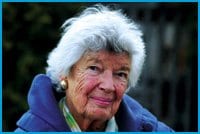June Callwood died on Apr 14 at age 82. On that day Canada lost one of the greatest champions of the underdog and I lost one of my most treasured friends.
By now, we all know June’s history. She was comfortable enough with her successes and her follies to publicly admit them time and again. Every newspaper, TV news and radio program listed her accomplishments since her death. If we didn’t know about them before, we do now. But to me there was, and is, much more to June Callwood.
We all know June was a leader in the fight for equal rights for everyone, including those in the gay community. June proved herself to be a friend to the community time and time again. A fixture in the Toronto Pride parade, she always generated cheers from the crowd. She took the stand twice in defence of The Body Politic, Xtra’s predecessor, when it was facing obscenity charges. She was one of the first to reach out to those stricken with “gay cancer” when everyone else reeled back in horror.
June’s response to AIDS was to found Casey House, named for the son she loved so much, who was killed by a drunk driver in 1982. Interestingly, when I asked her about her feelings for the driver, she simply said, “There was so much going on at the time, I didn’t have the time to think about him, or to hate him. I hope he’s okay.” She had forgiven him, without even thinking about it.
Casey House was created by a woman with incredible strength and deep wounds. She created a place of solace, of comfort and, ultimately, a place to die in peace.
June was at home with everyone. For a time, she was the “royal” reporter for the Toronto Star and went on tours with the royal family when they visited. She once described the Queen to me as, “a very pleasant lady, a lot of fun.” She used those exact same words to describe another woman, one we had both worked with who was homeless and had multiple mental health issues.
While out for lunch or dinner together June and I were often approached by wellwishers and fans. June always gave them a smile, a bit of her time and always insisted afterward that she wasn’t famous. She once told me that everyone thought she was Betty Kennedy. However, I think everyone felt they knew June personally.
I once asked June what accomp-lishment she was the most proud of. She answered, without even a pause, “My kids.” June loved her children and grandchildren above anything else.
I realized, after years of discussions with her, that it was this motherliness that made her care so much and do so much; she mothered everyone and every cause. After starting more than 50 organizations June was able to walk away and let others steer them. June wanted people, including her children, to make their own decisions about where they should go, and she supported them whatever their decisions might be.
I recall June telling me of her granddaughter’s decision to go to India. June was concerned for her, but determined to support her decision to go. She felt that people needed to be able to go out into the world unhindered by parents, disease, poverty — whatever was holding them back.
June had what my mother would have called “the common touch.” She truly cared about everyone she encountered, and did whatever she could for them. She felt strongly that all of us need to do what we can for those who don’t have as much. The only people June disdained were those who could help and didn’t.
When June told me about her cancer diagnosis, we sat at Le Papillon and cried together. We spoke, not for the first time, about the afterlife. June, famously, was not religious and didn’t believe in the hereafter. June lived for now, and I think it was this lack of belief that made her so focussed on the living. She had no time to worry about how good it would be in heaven and no patience to wait for it. She wanted perfection here and she wanted it now. Making things better for people she encountered was not something she needed to do to please a deity or to fulfill a dogma, she did it because it needed doing. I have no idea if there is an afterlife, but if it didn’t exist before June’s passing, I think she’s organizing it right now.
Despite her well-published encounters with depression, June always seemed to see the upside of things. My 40th birthday occurred after a spectacularly bad year. I invited 75 people to my birthday party and only nine showed up, including June. I was saddened, unsurprisingly. She hugged me and pointed to the few people standing around and said, “You know what your present is today? Now you know these are the people that really matter.”
June was right. She really mattered. She promised to be at my 50th. Knowing June’s grit, determination and bloody-mindedness, I think she just might.

 Why you can trust Xtra
Why you can trust Xtra


